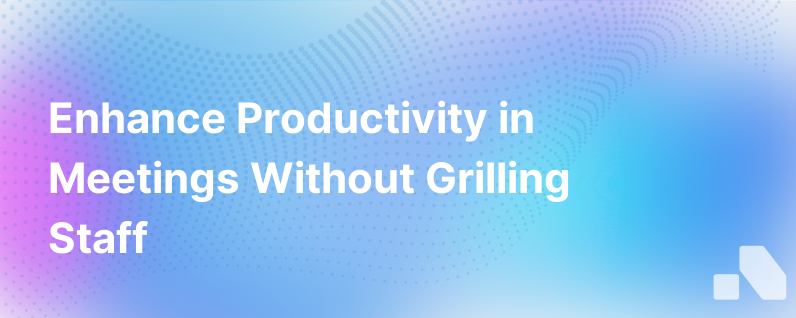
In a world where business operations are increasingly agile and employee well-being is seen as a cornerstone of productivity, traditional management tactics such as "cross-examinations" during meetings can feel antiquated and counter-productive. In many modern workplaces, the conventional 1:1 meetings, where managers may grill employees on their recent performance or demand justifications for their decisions, are giving way to a different kind of interaction – one that's more collaborative, supportive, and productivity-enhancing.
1:1s have the potential to be powerful tools for alignment and engagement, yet when these interactions turn into cross-examinations, they can create a hostile work environment, leading to stress, reduced morale, and ultimately, to less productive employees. Here’s why you should skip the cross-examinations in your 1:1s and what you should focus on instead to boost productivity and foster a positive workplace culture.
Understanding 1:1s: The Basis of Employee Engagement
1:1 meetings are often intended as sync-up sessions between a manager and their direct report. These meetings can be used for a variety of objectives:
- Tracking progress on tasks and projects
- Providing feedback and coaching
- Understanding and removing blockers
- Career development discussions
- Strengthening manager-employee relationships
When these goals are approached with a mindset of partnership rather than interrogation, 1:1s become far more effective. The approach should underscore mutual respect and trust, with managers playing the role of coach rather than a prosecutor.
Why Cross-Examinations are Counterproductive
Cross-examinations in 1:1s can create an adversarial atmosphere that often leads to several negative outcomes:
- Stress and Anxiety: Constant grilling can make employees dread 1:1s, leading to heightened stress and anxiety which, in turn, can impact overall well-being and work performance.
- Defensiveness: Defensive employees are less open to feedback, less likely to take risks, and less prone to sharing their ideas – all of which are essential to innovation and growth.
- Lack of Trust: Employees may respond to cross-examinations by hiding their mistakes or concerns, which defeats the purpose of 1:1s as a tool for honest and open communication.
- Erosion of Morale: Persistent cross-examinations can lead to a deterioration of morale within the team, as they may feel undervalued or mistrusted.
Strategies for More Productive 1:1s
The key to productive 1:1s is to foster an environment of trust and constructive dialogue. Here are some practical steps you can take:
- Prepare an Agenda: To ensure productive meetings, it's essential both parties come prepared with an agenda. Managers should encourage employees to list the items they wish to discuss and be ready to collaborate on solutions.
- Foster Open Communication: Encourage employees to speak openly about their successes, challenges, and ideas. This prevents the need for cross-examination and helps eliminate potential barriers to success.
- Focus on Coaching: Instead of fault-finding, use 1:1s to provide guidance and support. This can include discussing career aspirations and offering developmental resources.
- Acknowledge Successes: Recognition is a powerful motivator. During 1:1s, celebrate the employee's achievements and reinforce positive behaviors.
- Be a Resource, not a Roadblock: Ensure employees understand that their manager is there to help navigate challenges, not to create additional ones.
- Practice Active Listening: Give the employee undivided attention. Active listening builds rapport and shows that you value their input.
An effective 1:1 meeting leaves an employee feeling more energized, focused, and aligned with their work and team goals. As managers foster trust and champion their team’s development, they help cultivate a culture that prizes continuous improvement over punitive measures.
Metrics Over Cross-Examinations
As a manager, rely on metrics and data to guide inquiry in 1:1s. Since numbers don’t lie, they provide a neutral ground for discussing performance issues. By referencing data, conversations can remain focused on objective performance indicators rather than subjective judgments. This avoids the need for cross-examinations and promotes a data-driven approach to performance management.
Empathy Leads to Productivity
Within an empathetic workplace culture, employees feel heard, supported, and more engaged. Bringing empathy to 1:1s can revolutionize their impact on productivity. When employees are met with understanding concerning personal circumstances that might affect their work, they respond with greater commitment and engagement. Managers should practice empathy to build stronger, more resilient teams where every member feels they have the backing to excel.
Leveraging Technology
Technology can be a valuable ally in enhancing the productivity of 1:1 meetings. Tools like scheduling software can help organize meetings more effectively, and platforms for setting and tracking goals can facilitate productive conversations. Personalized tools and AI-driven platforms like Aomni not only streamline administrative tasks but also provide actionable insights that can be brought into discussion during 1:1s.
Conclusion
In summary, transforming 1:1s from cross-examinations into collaborative, coaching-based meetings can significantly increase the productivity of teams. By creating a supportive environment, focusing on clear communication, and leveraging technology, managers can lead their teams to higher morale, greater engagement, and improved performance. Remember, 1:1s are an investment in the most critical asset of any company – people. Make them count by engaging positively and constructively. If you're looking for tools to assist your 1:1s, consider exploring platforms like Aomni that can give you the competitive edge in developing your team's potential.